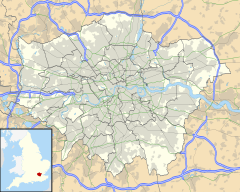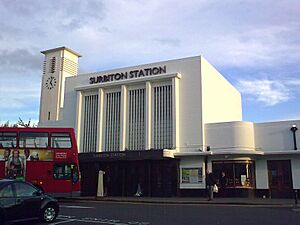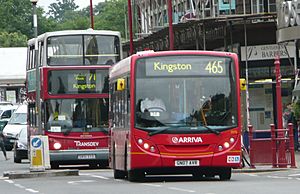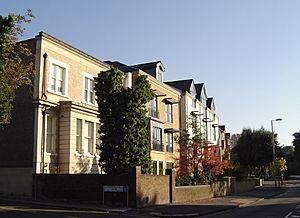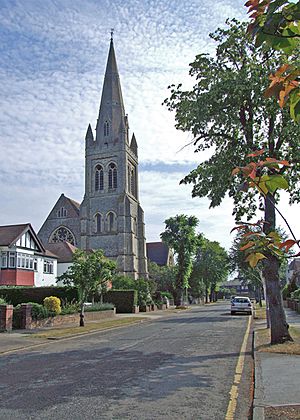Surbiton facts for kids
Quick facts for kids Surbiton |
|
|---|---|
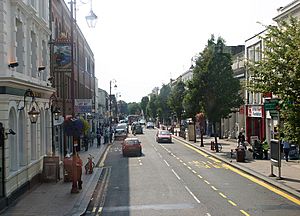 Victoria Road, Surbiton's high street |
|
| Area | 7.18 km2 (2.77 sq mi) |
| Population | 45,132 |
| • Density | 6,286/km2 (16,280/sq mi) |
| OS grid reference | TQ180673 |
| London borough | |
| Ceremonial county | Greater London |
| Region | |
| Country | England |
| Sovereign state | United Kingdom |
| Post town | SURBITON |
| Postcode district | KT5, KT6 |
| Dialling code | 020 |
| Police | Metropolitan |
| Fire | London |
| Ambulance | London |
| EU Parliament | London |
| UK Parliament |
|
| London Assembly |
|
Surbiton is a busy neighborhood in South West London, located in the Royal Borough of Kingston upon Thames. It sits right next to the River Thames, about 11 miles (18 km) southwest of Charing Cross. Surbiton used to be part of Surrey county. But since 1965, it has been part of Greater London. Surbiton includes five areas within the Royal Borough of Kingston upon Thames: Alexandra, Berrylands, St. Mark's, Surbiton Hill, and Tolworth.
Surbiton started as "Kingston-upon-Railway" in the 1840s. Today, you can see many different types of buildings here. There are grand 19th-century townhouses, cool Art Deco buildings, and newer homes. These mix well with the semi-detached houses from the 20th century. In 2016, about 45,132 people lived in Surbiton. This is about a quarter of all the people in the Royal Borough of Kingston upon Thames. Surbiton covers an area of about 7.18 square kilometers (2.77 square miles).
Contents
What's in a Name? Surbiton's Meaning
Surbiton got its current name in 1869. But the name has been around for a long time! It was called Suberton in 1179 and Surbeton in 1263. The name Sūth Bere-tūn comes from Old English. It means "southern farm" or "outlying farm." This is because it was south of Norbiton. Both Norbiton and Surbiton were once owned by the royal manor of Kingston.
Surbiton's Story: A Look Back in Time
Surbiton became a town because of a railway. There was a plan to build a train line from London to Southampton. But the council in nearby Kingston said no. They worried it would hurt their horse-drawn coach business. So, the railway line was built further south, through Surbiton.
Surbiton railway station opened in 1838. It was first called "Kingston-upon-Railway." It was renamed "Surbiton" in 1869. This was to avoid confusion with the new Kingston railway station. The Surbiton station you see today has a special art deco design.
Because of this, Kingston is now on a smaller branch line. But Surbiton, even though it's smaller, has fast trains! You can reach London Waterloo in just 16 minutes. You can also travel to places like Portsmouth and Southampton.
Surbiton was also home to Surbiton Studios. This was a film studio owned by Stoll Pictures. Later, the company moved its main work to another studio.
Getting Around Surbiton
Surbiton has many regular bus services. Transport for London buses like routes 71, 281, 406, 418, 465, K1, K2, K3, and K4 serve the area. Other bus companies also have routes here. These buses connect Surbiton to many places. You can go to Chessington, Kingston town centre, Twickenham, Hounslow, Epsom, Leatherhead, Dorking, Cobham, Staines, Weybridge, and Guildford.
Surbiton is also close to two of London's biggest airports. These are Heathrow and Gatwick.
Trains have been important to Surbiton since it began. Surbiton and Berrylands stations both have trains run by South Western Railway. These trains connect Surbiton to London Waterloo, Surrey, and Hampshire.
There's a plan for a new train project called Crossrail 2. If it gets approved, Surbiton will be connected to the London Underground system. This project is expected to make travel easier at Surbiton and Berrylands stations.
Surbiton does not have big motorways nearby. However, the A3 road passes through the Berrylands area. Parts of the A307, which runs along the River Thames, are now part of London's cycle routes.
Learning in Surbiton
People and Beliefs in Surbiton
Religion
For a long time, Surbiton was part of the All Saints Church in Kingston. Because of this, Surbiton's two main churches, Saint Mark's and Saint Andrew's, were built in the Victorian era.
There are two more Anglican churches in south Surbiton: Christ Church and Saint Matthew's. Both are also from the Victorian era.
Christ Church was built in 1862–63. It was designed by Charles Lock Luck. It has no tower and is made of red brick. The stained-glass windows were made by famous artists like Clayton and Bell and Burne-Jones.
Saint Matthew's was finished in 1875. It took less than two years to build! A man named William Matthew Coulthurst paid for the church and its first vicarage. He was a senior partner at Coutts Bank. There's a stone plaque outside the church that tells this story. It also says the church was partly built to remember his sister, Hannah Mabella Coulthurst. The original stained-glass window was destroyed by a V-1 flying bomb in 1944. New windows were put in later.
Other churches in Surbiton include Surbiton Hill Methodist Church, which opened in 1882. The Roman Catholic church of Saint Raphael's was finished in 1848.
In recent years, Surbiton has become more diverse. It now has a Sikh Gurdwara (a Sikh temple) and an Orthodox Jewish synagogue. According to the 2011 Census, Muslims are the largest minority religious group. The closest mosque is in Kingston upon Thames.
Nationality
In 2011, about 74% of people living in Surbiton were born in the United Kingdom. The largest group is "White British," making up two-thirds of the population. "White Other" is the second largest group.
Sports and Fun in Surbiton
Surbiton has a rich sports history!
The Surbiton Lawn Tennis Club hosted international tennis matches from 1900 to 1981. International tennis returned in 1998 with The Surbiton Trophy. This event is still played at the Surbiton Racket & Fitness Club.
Surbiton F.C. was an early football club. It was one of the clubs that started The Football Association in 1863. Today, Surbiton has football teams like Darkside FC, Surbiton Wanderers, and Surbiton Town Ladies FC.
Surbiton Hockey Club started in 1874. It is known as one of the best hockey clubs in the country. Both the men's and women's teams play in the top national leagues. Their youth section also trains many international players.
Surbiton is also home to the Surbiton Croquet Club. It is one of the strongest and largest croquet clubs in the country, with seven lawns.
The Cooper Car Company was based in Surbiton from 1946 to 1968. They won Formula One championships in 1959 and 1960. They also created the famous Mini Cooper car in 1961!
Surbiton's Location and Surroundings
Surbiton's land is mostly flat, except for a small hill in the middle. It is part of the Royal Borough of Kingston upon Thames in Greater London. It also borders the Borough of Elmbridge in Surrey. Surbiton includes smaller areas like much of Seething Wells.
Nearby Areas
Surbiton is a post town in the KT postcode area. This area includes the KT5 and KT6 postcode districts. KT5 covers Berrylands, Tolworth, and part of Surbiton. KT6 covers Tolworth, Long Ditton, and part of Surbiton.
 |
Hampton, East Molesey | Kingston Upon Thames, Petersham | Kingston Upon Thames |  |
| Thames Ditton | Berrylands, Old Malden | |||
| Long Ditton, Hinchley Wood | Chessington | Tolworth |
Images for kids
-
The clock tower in Surbiton. It was built to celebrate the 1902 coronation of King Edward VII.
See also
 In Spanish: Surbiton para niños
In Spanish: Surbiton para niños


